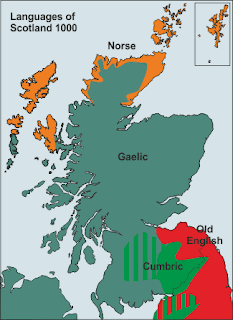Dennis Canavan is right. We do have to keep our eye on the ball. We do have to work together to achieve the win, because we still do have a hill to climb. So maybe I'm talking out of turn. I've already taken a pop at the old left, and now I'm going to talk about what I see as the misty-eyed romantic right: the idea that there is an authentic culture of Scotland, a true ethnicity: and that that culture, that ethnicity, is Gaelic.
What started me running is this multi-part article on the (generally excellent) Newsnet Scotland website. The article, too, is generally accurate. However, I believe it stretches a point about the extent of Gaelic in early medieval Scotland until it creaks. And in that creaking I hear an echo of special pleading which sounds to me distinctly racist.
As far as Galloway goes, there was limited Goidaelic penetration into Wigtownshire - mainly the Rhinns - during the dark age and into the early medieval period (but note that eighth and ninth century place names in the Machars - Wigtown, Whithorn, Glasserton, Sorbie - are Anglian). There are also several kirk-compound names (Kirkcowan, Kirkinner, Kirkmaiden, Kirkmedan) which include the Anglian 'kirk' element but in Brythonic or Goidealic word order. There are, of course, also a large class of names where the Brythonic and Goidaelic forms are sufficiently similar not to be diagnostic. So prior to the wars of independence all we can say is that Galloway as a whole and Wigtownshire in particular had an ethnic mix through this period with Anglian and Brythonic names for most elite settlements but some Goidaelic settlement names appearing in the West. It appears from the Latin forms used by the scribes of the Lords of Galloway from Fergus through to Alan that their native language was Welsh.
After the Wars of Independence - from about 1340 - everything changes. Many place names disappear altogether; many new, primarily Goidaelic, place names emerge. Some names (e.g. Hazelfield -> Auchencairn) are translated directly from an earlier language into Gaelic. This seems to represent a very widespread depopulation, with new Gaelic-speaking immigrants spreading in from the west.
And then by 1600 it's all changed again. Gaelic has vanished; all new names are in what we would now call Scots.
So there was a period of Gaelic ascendency in Galloway and I'll not deny it, but it was short - 250 years at most. This is, historically, one of the most mongrel parts of our mongrel nation, ethnically mixed as far back as you can go. Dammit, we know that the Romans settled veterans from both Syrian and Nubian (black African) legions on farms both north and south of the wall, and it's a very fair bet that the descendants of those people are still here.
Ireland has, historically, been one of the sources of Galloway's population, but it's one of many. The oldest inhabitants we know of were Brythonic, and their descendants are still here. The Anglians came in after the Kingdoms of the North were defeated at Cattraeth. The Norse came in sporadically along the coast in the ninth and tenth centuries (Eggerness, Borgue, Southerness, Almorness, Heston, Tinwald, Torthorwald). And the Irish came in. Given the importance of the trade route, we must assume some population movement back and forth between the Rhinns and the Belfast area going back into the stone age, but Gaelic is neither the original nor the most important nor the most enduring language of Galloway.
We don't need ethnic cleansing here. We don't need racism. There is no one true Scottish race. There is no one true Scottish language. Very few of us are of a single, pure, ethnic stock. We're mongrels. Mixed. The product of a complex, turbulent history. That's who we are. And it's who we've always been. King David the First didn't address his charters to 'omnibus hominibus tocius terra sue, Francis et Anglicis, Scottis et Galwensibus' for nothing. When William the Welshman won the Battle of Stirling Bridge, his colleague Andrew Moray was of Flemish extraction; and they were followed as leaders of the Scottish cause by Robert de Brus, a Frenchman with Norwegian ancestry.
Galloway (and Scotland) is not and never was a Gaelic province. It is not and never was Welsh or English or French or Norwegian or Syrian or Nubian. It was and is a glorious mixture of all these things and more, and we should celebrate that. This is no time for misty eyed, ill informed romantic myth making, and it's no time for racism. As Dick Gaughan sang, it's time now to sweep the future clear of the lies of a past that we know was never real.


No comments:
Post a Comment